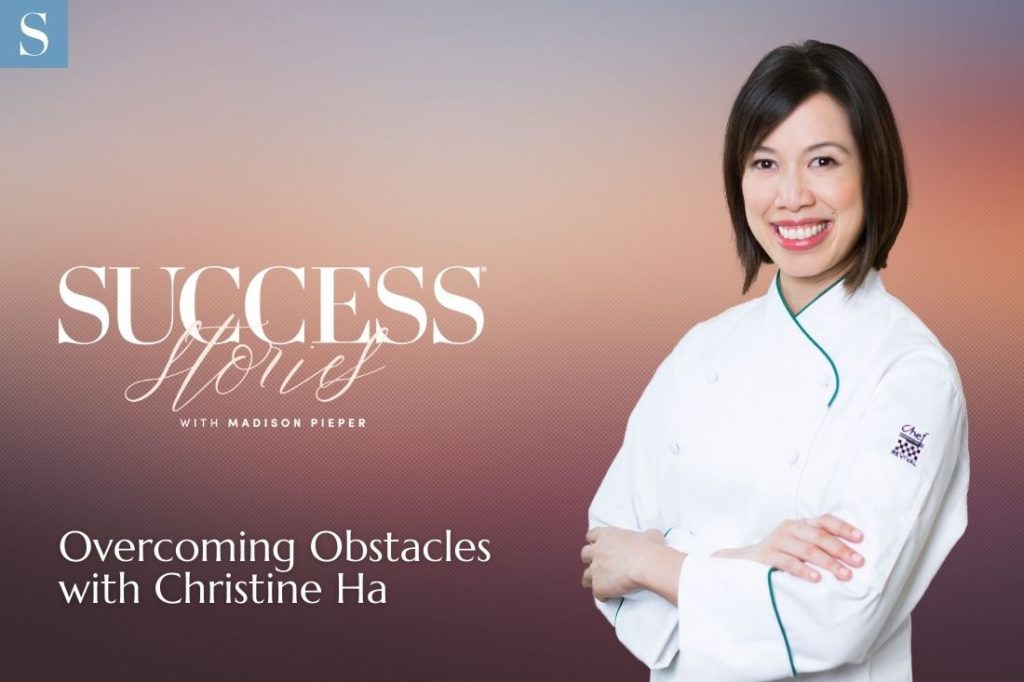When life gives you lemons, become a prize-winning chef.
The child of Vietnamese immigrants, Christine Ha taught herself to cook her parents’ native cuisine when she was in college. By then, her mother had died, and just as she was getting good in the kitchen, Christine started to lose her vision through a rare autoimmune disease.
Lonely and missing her independence, Christine taught herself to cook all over again, this time relying on her other senses. In 2012, she became the first blind contestant on cooking competition MasterChef—and won.
Now, Christine owns two Vietnamese restaurants and has written a cookbook, Recipes from My Home Kitchen. Her determination has inspired people around the world, but she’s humble about her achievements.
“I don’t feel special or anything: I just feel like I’m someone who figured out a way to live with these setbacks and adapt,” she says. “I believe that I’m a hard worker, but I also believe that a lot of my success comes from learning to seize the opportunity when it’s there.”
In this episode of SUCCESS Stories, Christine tells SUCCESS’s Madison Pieper about harnessing her competitive streak in a healthy way, trusting her instincts, and how she learned to cook without her vision one meal at a time.
Start with one step.
When you’re faced with a challenge that feels overwhelming, don’t try to tackle it all in one go. Focus on getting through the next day, or even the next hour. Every path forward is made of small steps.
After losing her vision, Christine relearned to cook by tackling manageable tasks one at a time. She started with cutting up fruit and vegetables, then moved on to frying an egg and boiling ramen. “Every small step led to bigger things,” she says.
Her initial goal was to regain some of her independence—she wasn’t necessarily thinking about cooking professionally. But as she gradually reclaimed old skills in new ways, she was motivated to keep pushing herself.
If you feel overwhelmed by a big life change, break it down into smaller pieces. Celebrate every little achievement as a building block that moves you closer toward your larger goal.
You don’t have to understand how someone feels to support them.
When someone you care about is going through a difficult situation, it’s tempting to tell them that you understand how they feel because you want them to feel less alone. However, this can actually have the opposite effect, Christine says.
Some people tried to equate her experience of losing her vision to difficult things they had been through. But it wasn’t the same, and didn’t make her feel better. Even people who have similar diagnoses respond differently, she points out.
Instead of trying to fit someone else’s experience into your own, acknowledge that you don’t know how they feel, but you’re there for them anyway.
“It’s important to let people know that you don’t completely understand, but you understand that it’s difficult, and that you’re here to do whatever it is that you can to help make their life a little bit easier,” Christine says.
Instead of responding with “I understand” or “I know how you feel,” try “I’m here for you.” Listen to what they need, and follow through on your promises.
Trust your instincts.
Trying to live up to other people’s expectations is exhausting. If you’re constantly saying yes to projects you’re not interested in, or making decisions based on what you think other people will like, it’s time for a gut check.
During Christine’s first few MasterChef challenges, she concentrated on making the types of fancy food she thought the judges expected. But after putting out some dishes she wasn’t especially proud of, she decided that she’d rather stick with what she knew and execute it perfectly. It was this decision that helped her find her groove.
That said, having faith in your own abilities isn’t always easy. As a woman of color who has a disability, Christine says that she still struggles with impostor syndrome and with prioritizing her needs and instincts over other people’s.
“We don’t necessarily think our voice matters, or that what we believe in is correct,” she says. “That’s a struggle I still have to this day, but I’m getting better at it. I want to push people to trust your gut more, regardless of where you’re from or what your background is.”
You can be competitive without being arrogant.
There is a difference between believing in yourself and your abilities and acting as though you’re superior to everyone else. Being competitive can be a useful trait; being arrogant will ultimately be a roadblock.
Christine knows that she’s competitive: “I’m the kind of person where if we pull out a board game, I’m always trying to win,” she says. But she tries to harness that side of her personality in a healthy way. She recognizes that however much she wants to win at everything, sometimes there will be a gap in her skills. When that happens, she tries to turn the experience into a lesson.
“I’m always here to learn, and there are always going to be things that are hard and maybe completely out of my comfort zone,” she says. “But I’m always going to try my best and hope that I come out on top.”
SUCCESS Stories with Madison Pieper is no longer releasing new episodes on the SUCCESS Podcast Network, but you can still listen to the full conversation below.




